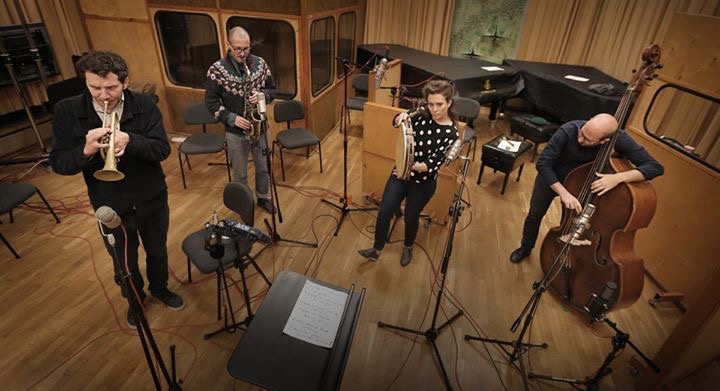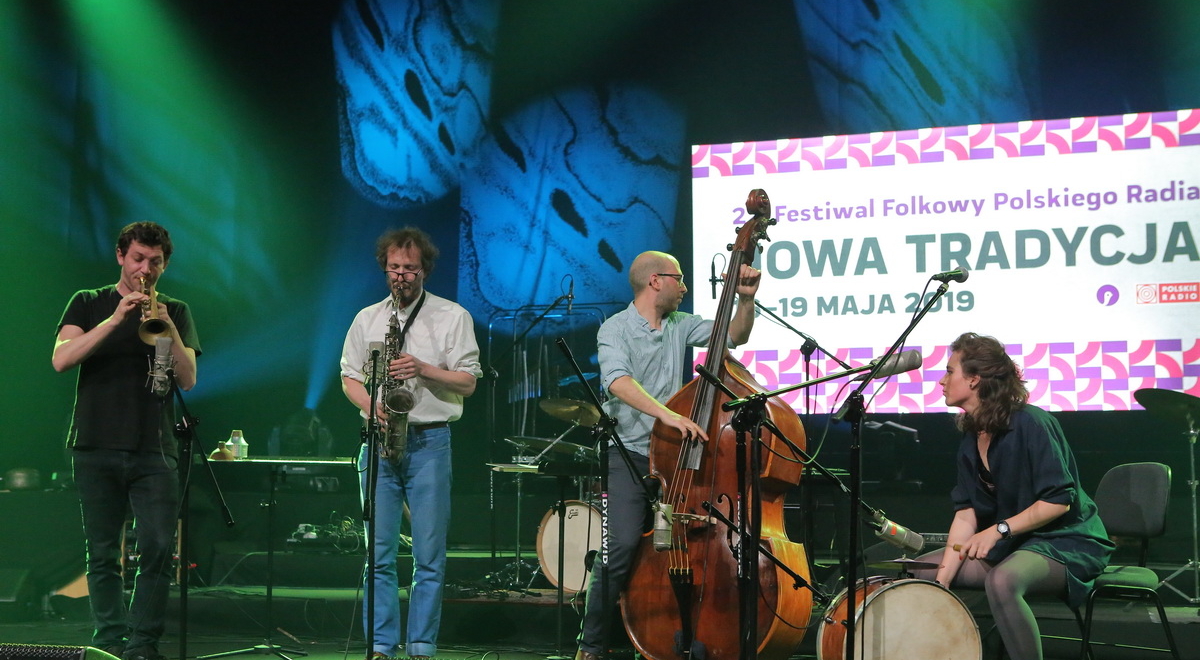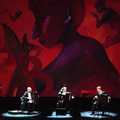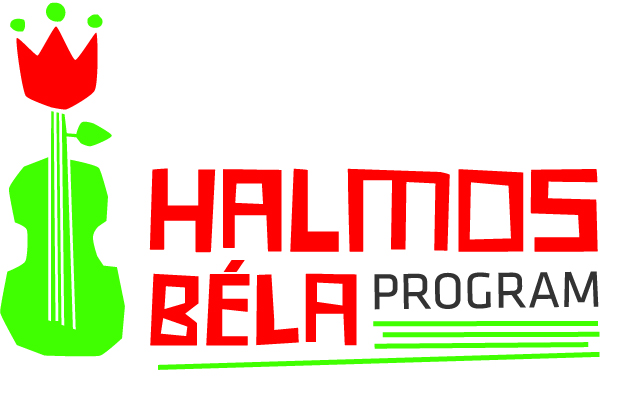 A Polish folk musician and three French jazzists have created something which is difficult to put into words. The raw-sounding improvisational music, fueled by Polish folk music digs deep, builds a solid foundation, then takes it to pieces and puts it all back together again and again. It is hardly enough to speak about it, it’s a must listen – over and over again. The band Lumpeks, winner of the Grand Prix at last year’s Nowa Tradycja Festiwal is going to release their first album this year. Olga Kozieł and Sebastian Beliah told us about roots, encounters, details and parallels.
A Polish folk musician and three French jazzists have created something which is difficult to put into words. The raw-sounding improvisational music, fueled by Polish folk music digs deep, builds a solid foundation, then takes it to pieces and puts it all back together again and again. It is hardly enough to speak about it, it’s a must listen – over and over again. The band Lumpeks, winner of the Grand Prix at last year’s Nowa Tradycja Festiwal is going to release their first album this year. Olga Kozieł and Sebastian Beliah told us about roots, encounters, details and parallels.
Olga, as the only Polish in the band, tell us about your bonds to Polish traditional music. Would you give us a picture about your musical interests, projects and works?
(Olga) I’ve been interested in Polish traditional music for the past 15 years. It began after hearing for the first time a traditional way of singing. Actually, it was a performance by my peers – colleagues from school. From the first sounds I was deeply touched. The impression was even physical. I heard freedom in the sound of voice like never before. Very shortly after I started learning how to sing with this technique that we call ‘a natural voice’. Since then I developed an interest in village culture, I wanted to meet village singers. I’ve been in numerous field expeditions in Poland, Ukraine, Belarus, Russia and once in Serbia as well. I took part in countless workshops, musical projects and exchanges. Not only for ‘natural voice’ technique, but also for contemporary (music) singing. Recently, I have started to lead my own projects, fulfilling ideas and musical dreams in raw singing traditions as well as in combining traditional music with different types of contemporary music. For years I have been singing only, and some time ago I decided to play instrumental music too. I am interested in traditional music for different reasons: the field expeditions and meeting singers, listening to archival recordings of old singers and players, creating different singing and instrumental groups, teaching singing, and creating different musical combinations. I’ve got the feeling that this material of traditional music gives endless perspectives!
As a performer, did you have any connections to the Polish jazz scene prior to Lumpeks? Did the jazz genre play any role in your (musical) life before?
(Olga) Yes, I already worked with some jazz musicians in the past. I had a chance to work with Tomasz Stańko who I always admired for his impact and ideas on the jazz trumpet. Funny enough, after years I started to play the trumpet myself. Maybe those meetings were that influential… Beside jazz, I also worked with contemporary composers such as Jerzy Kornowicz, Agnieszka Stulgińska, Aleksander Kościów. I very much appreciated working with John Tilbury on Cornelius Cardew’s piece The Great Learning as well. For a singer that’s a great adventure. Although I haven’t done many projects with jazz musicians, I’ve been interested in this genre for some time already. Since I studied musicology I had a chance to listen to the most inspiring lectures by my professor in history of jazz. So when we launched Lumpeks and the guys were dropping some names of great musicians – I was not lost.
In your view, what are the main similarities and differences between the French and the Polish jazz scene? Since these two have the most old-established jazz culture (and market) in Europe. In the 60’s the Polish jazz life turned intense, soon became international, still, developed it’s very own voice. How do you see it today?
(Sébastien) Sincerely I don’t know the Polish jazz scene so well. I moved to Poland five years ago without having precise knowledge about jazz in Poland. I knew the ‘big names’ like Tomasz Stańko or Krzysztof Komeda, but not really more than that, and since then I am trying to keep myself updated, going to concerts, listening to records or asking musicians about other musicians. I still feel that I have a lot to discover in this field. I can only tell that in Poland, as in many other countries in Europe, jazz music has been played since much longer than most people would think. Some orchestras that considered themselves jazz musicians, started to play in the 30’s a music that was very much influenced by American bands, but also probably by other European swing orchestras and sometimes local music. Of course, the World War II, the chaos of the post-war period and the rise of the communist regime created a hole in the Polish music production in general, but then the generation of the 60’s, led by key figures like Komeda, started creating music related to jazz, pretty specific to Poland, and of course a new generation of musicians is now giving a new breath to jazz in Poland. To sum up, I would say that since I moved to Poland, I have met some great musicians here and I feel that it will keep on going that way!
How did you (the French section of the band) encounter the Polish culture and traditions? What sparked the idea of a Polish-French jazz band based on Polish traditional music? What is your method for composing, what sources do you turn to, how do you choose the original songs or tunes? Tell us about the band’s musical conception.
(Sébastien) My first encounter with Polish traditional music happened thanks to my friend and fellow double bass player Joel Grip. After he travelled several times to Poland, he made some great connections in Lublin with some traditional musicians, and was so amazed by this music that he decided to invite some of them to our common festival in Paris and to his own festival in his home town of Dala-Floda (Sweden). For me both moments were stunning! In Paris, I had a chance to hear vocal music from different regions of Poland that moved me so deeply that now, a few years later, I am working with and even engaged to one of those singers (Olga Kozieł to name her)! In Sweden I heard for the first time a woman fiddler – Ewa Grochowska, playing music from the Radom region that truly astonished me. After deciding to move to Poland Ewa became an important figure in my musical journey in this country. It took me quite a long time to process the idea of doing some kind of musical encounter between jazz (which is my main musical background) and traditional music from Poland. Essentially because I didn’t want to go ‘the easy way’ and to just fool around with some Polish melodies as an excuse to improvise with a jazz twist. I wanted to have a better and deeper knowledge of this music. So I subscribed to every workshop I could, went to the countryside with friends to meet older musicians, listened to archives and concerts and got involved in as many initiatives related to this music as I could, in order to learn it. It took me some years, but I learned (and still learning) a lot from it, and met many great people.
To say some words about our work with Lumpeks: most of the music we are playing is coming from the central regions of Poland. I chose this music from the great diversity of many styles in Polish traditional music, because they attracted me the most. The melodies we play I know from archives (especially from the great ethnomusicologist Andrzej Bieńkowski and his record label Muzyka Odnaleziona) and from live performances that I had a chance to listen to. Usually Olga and I choose the material according to our taste and some personal criteria such as sound, rhythmic styles or type of dances. Then we send recordings to Louis and Pierre so that they can learn the melodies, then we meet and rehearse. Sometimes I already have ideas for arrangements, but often we work together on the material. Most of our methods consist of trying to find some specificities and details in those tunes that trigger our creativity. We are not traditional players. We are not trying to play the way traditional musicians would do – ten thousand times better than us. We are trying to focus on smaller details and different strategies for improvisations. We are navigating back and forth between the original melodies and improvisation so that both aspects are nourished by this experience.
Both Louis (trumpet) and Pierre (saxophone) have a very strong jazz background and like I do, so to speak, a more experimental background. They are not directly involved in any kind of traditional music but they are very curious musicians and are always searching for new uncommon connections. We have known each other for more than ten years and have played in many different formations such as swing big band, contemporary ensemble or totally improvised contexts. Musicians are talking a lot about music. They share what they like, what they discovered, everyone has his/hers own ‘cabinet de curiosités’. When I introduced Pierre and Louis to some Polish traditional music, I could feel straight away that they were moved by it, and when I decided to start Lumpeks they were very much into this project from the very beginning. You mentioned, that Polish traditional music reminded you of John Coltrane’s or Ornette Coleman’s music. Could you elaborate it?
You mentioned, that Polish traditional music reminded you of John Coltrane’s or Ornette Coleman’s music. Could you elaborate it?
(Sébastien) Of course this aspect is very much questionable, because it is only my inner feeling and, as every analogy, it has some great limits and contradictions. Nonetheless when I heard Polish traditional music for the first time (and this is still valid now) I saw some great analogy between this music and some form of jazz from the 60’s such as Ornette Coleman’s, John Coltrane’s or Albert Ayler’s. If I were trying to intellectualise those feelings, I would say that I see two main reasons for me to link those music. The first one is a certain approach to rhythm and dance. There is an incredible elasticity in the manner to treat the pulse in those music that makes me automatically feel a certain similarity. There is often an inexplicable togetherness between musicians who are playing both Polish traditional music and free jazz that is impossible to transcribe, quantize or even to reasonably explain. You simply have to experience it, feel it! This is part of the reason why Olga and I introduced Pierre and Louis to some of our friends who are almost strictly playing traditional music, so that they could really experience this feeling. The experience was so thrilling that some of those musicians are going to be our guests on a few tunes on our record. The second thing that pops up in my mind when I hear traditional music from Poland is the sound. There is a certain conception of how to make the instruments sound, a certain ability to look for expressivity through sometimes very radical use of the instruments that really reminds me of the way musicians from the 60’s were using in their music. The saturated saxophone’s sound of Albert Ayler and the almost ripping violin of Józef Kędzierski: for me there is a virtual parallel. Consequently when I formed the band Lumpeks I decided to keep this beautiful acoustic sound that those music are exploiting and suggested a line up that was some sort of a compromise: an ‘Ornette Coleman’s like’ quartet - with two horns and bass but the usual drum set replaced by the two traditional percussions from Poland: the baraban – a bass drum topped with a small cymbal, and the bębenek obręczowy – which is a frame drum.
Olga, you are the only Polish, the only woman, the only (basically) non-jazz musician in the band. From my point of view: a key figure. The sound of your traditional drum is even simpler than an early jazz-drum (with snare and hi-hat), which results in a very pure and raw sound. Being a singer is a typical role for women in both traditional music and jazz, however being a drummer is definitely non-typical in jazz. How do you describe your role in Lumpeks?
(Olga) I think that my role is to explain as much as I can about the context of the music that we use as our inspiration. We’ve got dance tunes, wedding songs, love songs. I explain what is what and on which occasions it was played. In the music as well, there are some meaningful moments, like this part called ’weksel’ – few bars with simple notes to gather musicians together, have a little rest or prepare for a change of melody. I’m the one who knows its meaning. I hope as well that I am in this band to bring this special raw sound and specific way of drumming and singing.
You won the Grand Prix at Nowa Tradycja Festiwal in 2019. Tell us about your experiences, the reaction of the jury – considering that your band is only 25% Polish. (Watching the stream of the competition I was wondering how open the Polish scene could be to an independent musical interpretation…)
(Sébastien) We were very much amazed by the very warm welcome we received from the jury in Nowa Tradycja. After our performance I thought that maybe we are going to be considered as phonies or crooks, but finally I felt that every member really understood our intention: using the idiom of traditional Polish music to improvise. Of course among Polish musicians involved in traditional music, some of them are questioning our choices and considering us as vandals, or people using their music the ‘wrong way’ but I think it is mostly due to some misunderstanding or to a narrow conception of this tradition according to me. Beside this epiphenomenon we met a very kind and open minded audience in Poland every time we played.
(Olga) I’m very grateful that the jury allowed three non-Polish musicians to win. I interpret it in the way that we, Polish people, are not afraid to share our heritage. I’m happy that the judgment was not about the origin of the musicians, but the music itself. Ours, apparently, made the biggest impression on the jury. The next morning after the results we had a meeting with the whole jury where each member told us what he/she thinks about us and our music. That was when we got to know that they all appreciated what we did and were happy that we took part in this competition. Never before was there a jazz band presenting themselves in this competition.
You have already recorded your first album, which was scheduled for release in May, but had to be postponed due to the pandemic. How are you coping with the recent situation? Can you make plans for the rest of the year?
(Sébastien) The actual situation is very complicated for us, musicians. All our activities are stopped and the perspective to play, and to go back to normal seems pretty far from us (some say maybe in September). It is very unusual to have such plenty of time ahead of us with no particular goal. So we are trying to plan concerts for the next year, considering that everything is hypothetical. Personally, I am trying to avoid social media and streaming concerts because I don't feel like they really suit my vision of music as a social art. I think it should be OK to accept the void of the situation and to embrace it to take advantage of it. I hope that the complexity of this situation will show the failure of our political choices and will help develop a new way of imagining the world around us.
LUMPEKS
Louis Laurain: trumpet
Pierre Borel: alto saxophone
Olga Kozieł: voice and percussion
Sébastien Beliah: double bass
weboldal
facebook
More Warsaw Return articles here
THE INTERVIEW WAS SUPPORTED BY THE WACŁAW FELCZAK FOUNDATION


A bejegyzés trackback címe:
Kommentek:
A hozzászólások a vonatkozó jogszabályok értelmében felhasználói tartalomnak minősülnek, értük a szolgáltatás technikai üzemeltetője semmilyen felelősséget nem vállal, azokat nem ellenőrzi. Kifogás esetén forduljon a blog szerkesztőjéhez. Részletek a Felhasználási feltételekben és az adatvédelmi tájékoztatóban.


